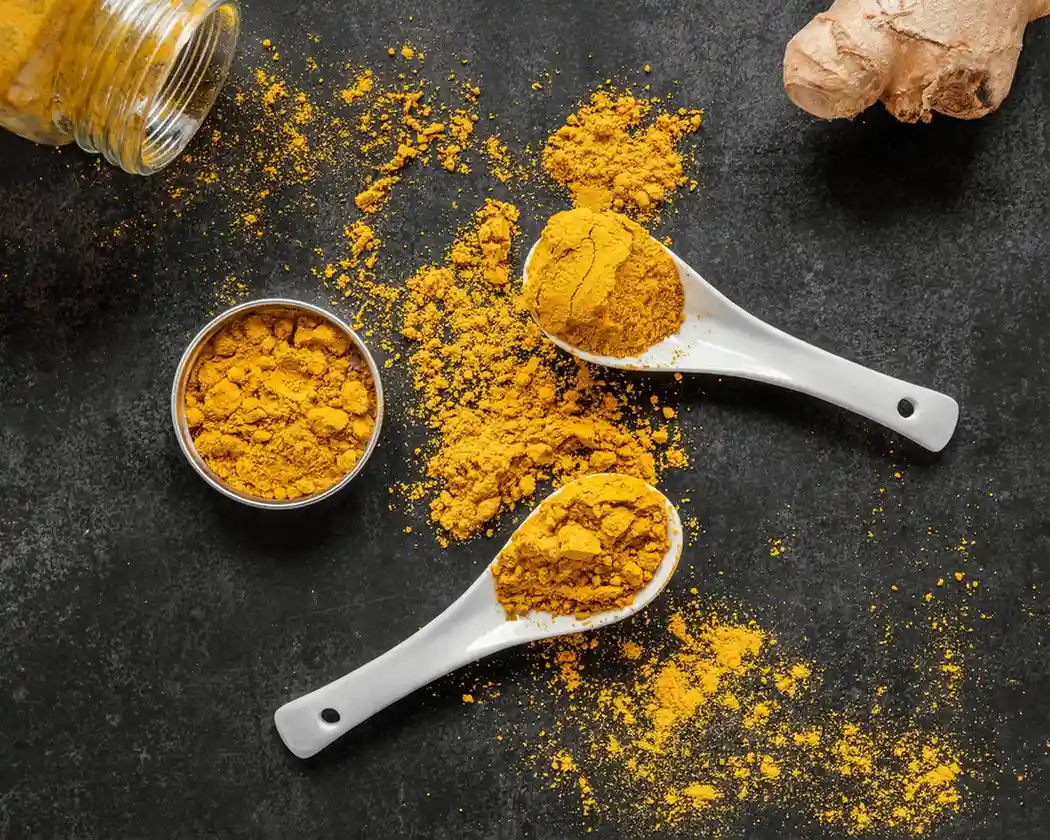Table of Contents
Turmeric has been used for centuries as both a spice and a natural remedy, but many people today want to know exactly how long it takes to work.
The answer depends on your health goals, how you take it, and how consistently you use it.
Key takeaways:
-
Most people start noticing turmeric’s effects in about 4 to 8 weeks of daily use.
-
Curcumin, the main compound in turmeric, helps lower inflammation and protect cells from damage.
-
Pairing turmeric with black pepper or healthy fats makes it easier for your body to absorb.
-
Taking it consistently is the best way to get lasting results.
How Turmeric Works in the Body
Turmeric works by delivering curcumin and other active compounds that reduce inflammation, fight oxidative stress, and support overall health. These compounds interact with your cells, signaling pathways, and immune system to promote balance and healing.
Curcumin, the most studied compound in turmeric, is known for its powerful antioxidant and anti-inflammatory effects (1).
It helps block certain enzymes and molecules that trigger inflammation, which may ease joint pain, improve mobility, and support organ function (2).
However, curcumin is not easily absorbed by the body on its own. Taking turmeric with black pepper (which contains piperine) or with a healthy fat can boost absorption significantly (3).
The form you choose, such as fresh root, powder, or a standardized supplement, also affects how quickly and effectively it works.
How Long Does It Take for Turmeric to Work?
Most people notice benefits from turmeric within 4 to 8 weeks of daily use. This is the time it often takes for curcumin to build up in the body and produce noticeable changes in inflammation, pain levels, or overall well-being.
Some people feel subtle improvements sooner, especially with high-quality, bioavailable supplements.
Others may need more time depending on their condition, dosage, and lifestyle. Consistency is key; skipping doses or taking too little can delay results.
Timeline by Health Benefit
-v1755649505216.webp) While turmeric supports many aspects of health, the timeline for seeing results can vary depending on the specific benefit you’re targeting.
While turmeric supports many aspects of health, the timeline for seeing results can vary depending on the specific benefit you’re targeting.
Inflammation Relief
Turmeric may start reducing inflammation in 4 to 8 weeks when taken daily in an absorbable form. Studies show curcumin can lower inflammatory markers like CRP and cytokines, helping reduce swelling and discomfort over time (4).
The effect is gradual and becomes more noticeable the longer you maintain a consistent intake.
Joint Pain & Mobility
For arthritis and joint stiffness, benefits are often reported after 4 to 8 weeks. Turmeric can ease pain by reducing joint inflammation and preventing further cartilage damage (5).
Some people also experience improved range of motion, making everyday activities more comfortable.
Digestive Support
Digestive benefits, such as reduced bloating, gas, or indigestion, may take 8 to 12 weeks. Turmeric supports bile production, which aids fat digestion, and its anti-inflammatory effects can soothe the gut lining (6).
People with chronic digestive issues may see more gradual improvements.
Cognitive & Mood Support
Turmeric’s effects on brain health and mood are typically seen after 8 to 12+ weeks. Curcumin may increase brain-derived neurotrophic factor (BDNF), which supports memory and learning, and can influence neurotransmitters linked to mood (7).
These changes happen slowly and may be more noticeable with long-term use.
Skin Health & Immune Function
Improvements in skin tone, acne, or eczema may take several months of consistent use. Turmeric’s antioxidants help protect skin cells from damage and reduce inflammation, which can also strengthen the immune system over time (8).
Some people notice fewer colds or infections after regular use, but results vary.
Factors That Influence How Fast Turmeric Works
 How quickly turmeric works depends on several personal and product-related factors. Paying attention to these can help you set realistic expectations.
How quickly turmeric works depends on several personal and product-related factors. Paying attention to these can help you set realistic expectations.
Dosage: Clinical studies often use 500 to 2,000 mg of curcumin per day. Lower amounts may still help, but results might take longer to appear.
Form of Turmeric: Fresh root, powdered spice, capsules, and liquid shots all have different absorption rates. Supplements with standardized curcumin are usually more potent.
Bioavailability Enhancers: Taking turmeric with black pepper (piperine) or a healthy fat can improve absorption dramatically.
Consistency: Skipping doses or taking turmeric irregularly can slow down progress.
Overall Health: Age, body weight, metabolism, and the severity of your condition all affect how quickly you notice changes.
How to Take Turmeric for Best Results
 Turmeric works best when it’s absorbed efficiently and taken in a way that suits your daily routine.
Turmeric works best when it’s absorbed efficiently and taken in a way that suits your daily routine.
Pair with Black Pepper: Piperine in black pepper can boost curcumin absorption by up to 2,000 percent.
Take with Healthy Fats: Since curcumin is fat-soluble, pairing it with oils like coconut, olive, or avocado can help your body absorb more of it.
Use Curcumin Supplements: Standardized supplements ensure you’re getting a consistent and effective dose of curcumin each day.
Choose Bioavailable Forms: Options like liposomal curcumin, nano-curcumin, or liquid shots can increase absorption compared to raw powder.
Take with Food: Having turmeric with a meal can improve absorption and reduce the risk of mild stomach upset.
Signs Turmeric Is Working
When turmeric starts taking effect, you may notice subtle but meaningful improvements in how you feel.
Less stiffness and swelling in joints.
Reduced muscle soreness after activity.
Fewer digestive issues such as bloating or discomfort.
More stable energy levels throughout the day.
A brighter mood and improved focus.
Clearer skin and fewer flare-ups of irritation.
Are There Any Side Effects?
 Turmeric is generally safe for most people when taken in recommended amounts, but high doses or long-term use can cause mild side effects in some cases.
Turmeric is generally safe for most people when taken in recommended amounts, but high doses or long-term use can cause mild side effects in some cases.
The most common side effects are digestive, such as nausea, diarrhea, or mild stomach discomfort, especially if you take large amounts on an empty stomach.
People with gallbladder problems, bleeding disorders, or those taking blood thinners should be cautious, as turmeric can worsen these conditions or interact with medications.
It is also worth noting that curcumin supplements may affect how your body processes certain drugs, including those for diabetes, blood pressure, and heart conditions.
Pregnant or breastfeeding women should speak with a healthcare provider before starting a turmeric regimen.
Conclusion
Turmeric can offer powerful health benefits, but it works gradually. Most people notice changes in 4 to 8 weeks, with some benefits taking longer.
The speed of results depends on factors like dosage, form, and consistency, as well as your personal health profile. Pairing turmeric with black pepper or healthy fats can improve its effectiveness.
Used correctly, it can support joint health, reduce inflammation, aid digestion, and contribute to overall well-being over time.
FAQs
Can turmeric work faster if I take more?
Taking more turmeric will not necessarily make it work faster and may increase the risk of side effects like stomach upset. The best approach is to take a clinically supported dose, usually 500 to 2,000 mg of curcumin per day, consistently for several weeks.
Is turmeric safe to take every day?
For most healthy adults, daily turmeric use is safe when taken in recommended amounts. However, people with certain medical conditions or those on blood-thinning or diabetes medications should consult a healthcare provider first.
How long should I take turmeric before giving up?
You should give turmeric at least 8 to 12 weeks before deciding if it works for you. Some benefits, like reduced inflammation, may appear sooner, while others, such as cognitive support, can take longer.
Can I get results just from turmeric in food?
Adding turmeric to meals can provide health benefits, but it typically contains much less curcumin than supplements. For noticeable results, a concentrated form with enhanced absorption is often more effective.



